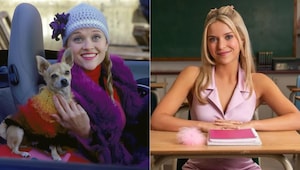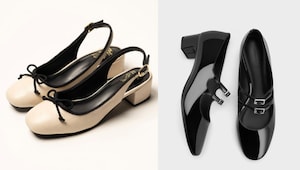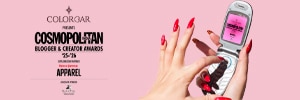The real reason why Gen Z may be ageing faster than millennials
Spoiler: It’s not your genes or your sunscreen—it’s everything else.

If you're under 27 and feel like you somehow look older than your age (no judgment here), you're definitely not imagining it. You might be ticking off every box on the wellness checklist: 10-step skincare routine? Check. Green juice and protein bowls? Check. Eight hours of sleep and 10k steps a day? Trying. And yet, Gen Z is collectively giving off mid-life crisis energy, while millennials—yes, the ones juggling toddlers and taxes—are somehow glowing like they just stepped out of their mid-20s.
Wait, they're what age again?
Interestingly, there was a time when millennials were called the “burnout generation” for the same reason that Gen Z is today. I guess that has more to do with older generations always having something to say about the younger generations. But for millennials, this can be seen as a complete 360, because somehow, they’re finding their groove in their 30s and 40s. They’re embracing skincare, therapy, and slow living, but they're doing it all with a sense of balance.
“Millennials are more likely to use corrective treatments when needed, be it laser treatments, microneedling, or even the occasional fillers, but they aren’t overloading their skin with constant experimentation. This helps maintain a healthy, resilient skin barrier,” says Dr Sharad.
There’s also less pressure to keep up with every new trend or viral beauty product approved by TikTok. “Millennials are more likely to stick with what works instead of constantly switching routines because of viral videos,” Sharad adds.
Gen Z is emotionally burnt out—and it shows
If Gen Z seems older, it’s also because they feel older. Emotionally, psychologically, they’re exhausted. “It's because of chronic emotional fatigue,” explains counselling psychologist Ruchi Ruuh. “Gen Z is constantly under pressure to perform, to succeed, to stay politically and emotionally aware, and often without the structural support that millennials had.”
Unlike millennials, who defined adulthood through milestones like moving out, getting a job, or settling down, Gen Z often equates growing up with financial instability and emotional burnout. After all, they entered adulthood during a global pandemic, battling a mental health crisis and a cost-of-living nightmare. “There’s a sense of always being in survival mode, which leads to pessimism, anxiety, and a kind of emotional shutdown,” Ruuh adds.
This psychological strain often shows up in how Gen Z carries themselves, how they speak, and how they look as well. “Chronic stress increases cortisol, which breaks down collagen and leads to dullness, fine lines, and inflammation,” says Dr Sharad. “It’s a stress response that shows up on your skin.”
So why are millennials looking younger?
They've started doing the work—therapy, boundaries, introspection, and that shows. “Many millennials are redefining what it means to be 30 or 40,” says Ruuh. “They’re healing, growing, and creating space for joy.”
It also helps that millennials gave themselves more buffer time. They didn't expect to be emotionally evolved, politically aware, and professionally successful, all by 21. “Millennials had time to make mistakes, figure things out, and grow into adulthood, whereas Gen Z often feels like they have to fix themselves by the time they hit 20.”
Ruuh talks about relationships and how millennials are dating with more playfulness and self-awareness, too. They're less consumed by overanalysis and are more in tune with emotional connection. Gen Z, on the other hand, describe dating as emotionally exhausting or even unsafe. “These markers show up as detachment, emotional numbness, or a tendency to romanticise hyper-independence,” Ruuh adds.
The irony is that Gen Z has access to the best skincare, mental health awareness, and an entire internet full of hacks, and yet, they're ageing faster, inside and out. Millennials, once ridiculed for their side parts and skinny jeans, are glowing with a kind of calm, collected confidence that screams: “I’ve done the work.” They have embraced self-care in a way that prioritises mental peace. Meanwhile, Gen Z, although more informed and socially conscious, is often overwhelmed by a world moving too fast and the internet that never sleeps.
Gen Z, you're not ageing badly, you're just burnt out
You could be 23, feeling (or looking) 33, but it’s not you, and no, you’re not doing anything wrong. Maybe the answer just isn’t in your skincare shelf. Maybe it’s in slowing down, logging off, and giving yourself space to just be. Because ageing was never the enemy (just ask the millennials). It’s the burnout that’s making everything feel heavier than it should.
You weren’t meant to optimise every second of your day or live life through to-do lists and wellness hacks. It’s okay if your five-step morning routine is just getting out of bed. Some days, surviving is enough.
Because feeling young isn’t about looking perfect, it’s about having the space to actually live.
Lead image credit: Netflix
Also read: Is hyper-independence harming your relationships?
Also read: Why "touching grass" is Gen Z's answer to overstimulation
more from Life

Stroll, don’t scroll: 5 fun things to do during lunch that don’t involve your phone

A recap of the previous standout winners from the Cosmopolitan Blogger & Creator Awards – Lifestyle Edition

'Legally Blonde' prequel 'Elle' is on its way and already renewed for Season 2

Dream job alert: This Indian startup is paying ₹1 Lakh to interns – for skincare

The psychology behind friendship trios and why they don’t always last

Why everyone is choosing 'admin nights' over going out

Why young people are ‘retiring’ early at this viral Malaysian retreat

Why the heeled ballet flat is the office shoe everyone’s switching to

‘Lean into sexual currency’: How to initiate sex when you and your partner are struggling to get into it

‘Deeper, hotter, hornier—and more yearning’: What sex and dating will look like in 2026


